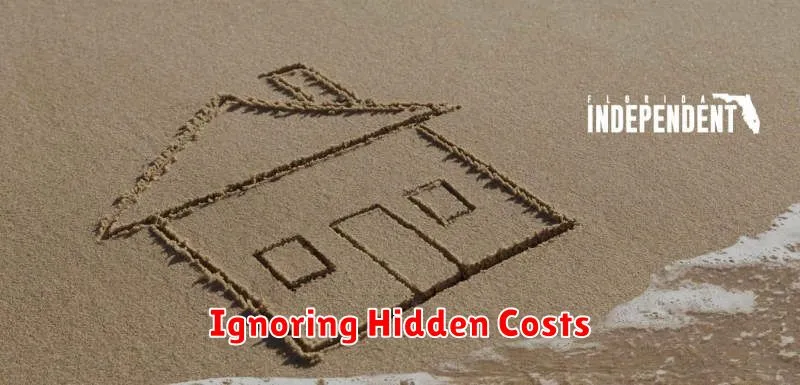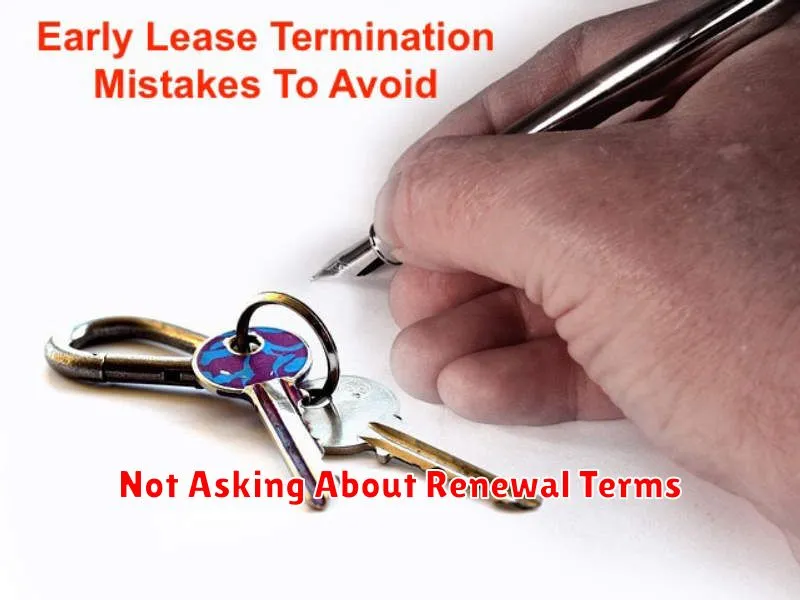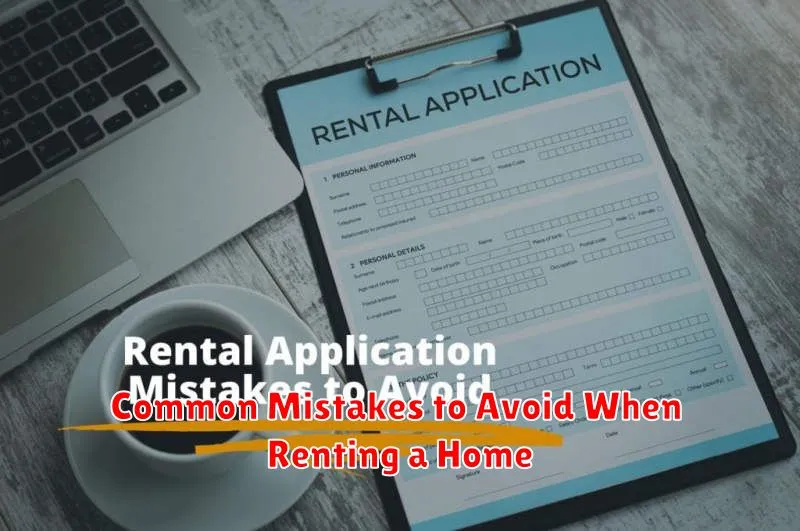Renting a home can be an exciting yet daunting process. Making the right choices is crucial to ensure a positive living experience. However, many renters, especially first-timers, often fall prey to common mistakes that can lead to future headaches. This article will explore some of the most common mistakes to avoid when renting a home, empowering you with the knowledge to navigate the rental market effectively and secure the ideal rental property. Understanding these potential pitfalls will help you avoid costly errors and make informed decisions throughout your rental journey.
From neglecting to thoroughly read the lease agreement to underestimating the importance of a rental budget, these missteps can have significant consequences. Failing to conduct a proper inspection of the property or ask the right questions can lead to unexpected issues down the road. By familiarizing yourself with the common pitfalls of renting a home, you can protect yourself from future problems and enjoy a smooth and stress-free tenancy. This guide will provide valuable insights into the rental process and equip you with the tools you need to make smart choices and secure a comfortable and suitable home.
Not Reading the Lease Carefully
One of the most common and costly mistakes renters make is not thoroughly reading their lease agreement before signing. A lease is a legally binding contract, and failing to understand its terms can lead to unexpected expenses and disputes with your landlord.
Take the time to carefully review every clause, including details about rent payments, late fees, maintenance responsibilities, pet policies, and the length of the tenancy. If anything is unclear, ask for clarification from the landlord or a legal professional. Understanding your rights and obligations as a tenant is crucial for a smooth and positive rental experience.
Skipping the Property Inspection
One of the most crucial steps in the rental process is the property inspection. Never skip this step, even if you’re in a hurry. A thorough inspection protects both you and the landlord.
Document everything. Note any existing damage, from minor scratches to major appliances malfunctions. Take photos and videos as evidence. This documentation will be crucial if disputes arise later regarding security deposits.
Look for potential problems. Check for signs of water damage, pest infestations, or faulty wiring. Ensure appliances are functioning correctly and that heating and cooling systems work. A careful inspection can save you from costly repairs and uncomfortable living conditions down the line.
Ignoring Hidden Costs

Renters often focus solely on the advertised monthly rent, overlooking potentially significant hidden costs. Failing to account for these expenses can strain your budget and lead to financial difficulties.
Utility expenses such as water, electricity, gas, and internet are commonly overlooked. Inquire about average utility costs for the unit to accurately estimate your monthly expenses.
Parking fees, especially in urban areas, can add a substantial amount to your monthly costs. Clarify whether parking is included in the rent, and if not, determine the associated fees.
Pet deposits or fees are common in many rentals. If you own a pet, factor in any non-refundable pet fees or monthly pet rent.
Renter’s insurance, while not always mandatory, is strongly recommended to protect your belongings against damage or theft. Include the cost of insurance in your budget calculations.
Assuming Repairs Are Always Covered
A common misconception among renters is that all repairs are the landlord’s responsibility. This is not always the case. Lease agreements often specify which repairs are covered by the landlord and which are the tenant’s responsibility.
Generally, landlords are responsible for structural issues, major appliance malfunctions (if provided), and problems related to habitability. Tenants, however, are often responsible for minor repairs and damages caused by their negligence or misuse.
Carefully review your lease to understand your responsibilities. Failing to address minor repairs can sometimes lead to larger, more costly problems down the line, for which you may be held liable. Clarifying responsibilities upfront avoids disputes and unexpected expenses later on.
Failing to Document the Property Condition
A crucial step often overlooked is thoroughly documenting the property’s condition before moving in. Failing to do so can lead to disputes and unexpected costs at the end of your lease.
Upon receiving the keys, conduct a detailed inspection and document any existing damage, no matter how small. Take clear photos or videos, noting imperfections like scratches, dents, or stains. Compile a written report and share it with your landlord, ensuring they acknowledge its receipt. This record serves as crucial evidence should disagreements arise regarding the security deposit.
Not Understanding Eviction Rules
One of the most crucial aspects of renting is understanding the eviction process. Ignorance of local and state laws regarding eviction can leave renters vulnerable to unfair practices and sudden displacement.
Familiarize yourself with the legitimate grounds for eviction in your area. These commonly include non-payment of rent, violation of lease terms, or causing damage to the property. Knowing your rights and responsibilities as a tenant is paramount.
Understand the proper eviction procedure. Landlords must follow specific legal steps, including providing proper notice. Be aware of the timeline involved and your options for recourse if you believe the eviction is unjustified.
Missing Utility Responsibilities
One common oversight when renting is clarifying utility responsibilities. Carefully review your lease to determine which utilities you are responsible for. These commonly include electricity, gas, water, sewage, and trash removal. Some landlords include certain utilities in the rent, while others leave them entirely to the tenant.
Misunderstanding these responsibilities can lead to unexpected bills and disputes with your landlord. Ensure you understand the payment process for each utility, including setting up accounts in your name and making timely payments to avoid late fees or service interruptions. Don’t assume anything – clarify all utility-related questions with your landlord before signing the lease.
Not Asking About Renewal Terms

Failing to inquire about lease renewal terms is a significant oversight. Understanding the process and conditions for renewing your lease is crucial for long-term planning.
Key questions to ask include: How much notice is required for renewal? Will the rent increase, and if so, by how much? Are there any changes to the lease terms upon renewal? Clarity on these points can prevent unexpected rent hikes or lease terminations, allowing you to make informed decisions about your housing situation.
Not addressing these questions upfront can put you in a vulnerable position when your lease term nears its end.
Renting Without Renter’s Insurance
One of the most common and costly mistakes renters make is foregoing renter’s insurance. Many tenants mistakenly believe their landlord’s insurance covers their belongings, but this isn’t the case. Landlord insurance protects the building structure, not the contents inside individual units.
Renter’s insurance provides crucial financial protection against losses from events like fire, theft, and water damage. It also offers liability coverage if someone is injured in your apartment. The cost of renter’s insurance is generally quite affordable, especially when compared to the potential expenses of replacing all your possessions.
Consider this: Could you afford to replace everything you own out of pocket? If not, renter’s insurance is a necessary investment for your peace of mind and financial security.
Failing to Get Everything in Writing
One of the most common and costly mistakes renters make is failing to get everything in writing. Verbal agreements offer little protection if a dispute arises. A written lease agreement acts as a legally binding contract, outlining the terms and conditions of the tenancy, protecting both the landlord and the tenant.
Key aspects to ensure are documented include the monthly rent amount, the length of the lease, security deposit details, and responsibilities for repairs and maintenance. Without a written record, disagreements about these crucial details can quickly escalate into complex and stressful situations.
Don’t rely on verbal promises or assumptions. Insist on a comprehensive, written lease agreement before moving in. This simple step can save you significant stress and potential financial losses down the road.

